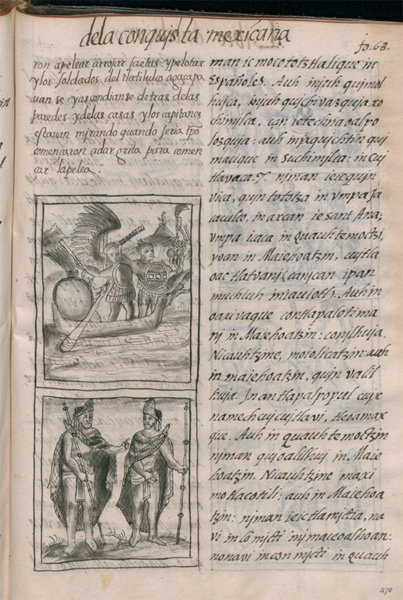Folio 63 recto
Translations and Transcriptions
Spanish Translation
[Translation of the Nahuatl into Spanish by Fr. Bernardino de Sahagún; transcription of the Spanish (left-hand column) by James Lockhart:] [f. 63r.] ron a pelear arrojar saetas y pelota: y los soldados del tlatilulco agaçapauanse y ascondianse detras de las paredes y de las casas y los capitanes estauan mirando quando seria tp̄o començaron a dar grita para començar la pelea.
English Translation
[Translation of the Nahuatl (right-hand column) by James Lockhart:] The Spaniards retired. What the Xochimilco people had told themselves they would do was just to destroy us by stealth. And [the Mexica] hurriedly took all the people of Xochimilco, Cuitlahuac, etc., whom they had captured to Yacacolco, where [the church of] Santa Ana is now; there stood Quauhtemoctzin and Mayehuatzin, the ruler of Cuitlahuac (for he was here during the time that war was waged). Those who had been captured greeted Mayehuatzin, saying to him, “Take it slowly, my lord.” But Mayehuatzin replied to them, “You wretches, did I invite you? What have you done?” Then Quauhtemoctzin said to Mayehuatzin, “My lord, please do your service.” Then he offered sacrifices, killing four of his subjects; Quauhtemoctzin also killed four. [Translation of the Spanish (left-hand column) by James Lockhart:] to fight, shooting crossbow bolts and musket balls. The soldiers of Tlatelolco crouched and hid themselves behind the walls and the houses; the captains, looking for when it would be time, began to call out for the battle to begin.
Analytic Transcription
[Transcription of the Nahuatl (right-hand column) by James Lockhart:] [f. 63r.] man ic mocototztlalique in Españoles. Auh in iuh quimolhuica, in iuh quichivazquia xochimilca, çan ic technaoalpolozquia: auh in ixquichtin quimacique in suchimilca: in Cuitlavaca .&. niman ie ic quinvica, quintototza in vmpa Iacaculco, in axcan ie sant Ana; vmpa icaca in Quauhtemoctzi, yoan in Maiehoatzin, cuitlaoac tlatoani (ca nican ipan muchiuh in iauiotl). Auh in oaxivaque contlapalotimani in Maiehoatzin: conilhuia. Nicauhtzine, moiolicatzin: auh in maiehoatzin, quinvalilhuia. In antlapalpopul cuix namechcuicuitlavi, tle oamaxque. Auh in quauhtemoctzin niman quioalilhui in Maiehoatzin. Nicauhtzine ma ximotlacotili:* auh in Maiehoatzin: niman ie ic tlamictia, navi in cōmicti in imaceoalhoan: no navi in conmicti in Quauh ---------- *MA XIMOTLACOTILI. The verb tlacoti 'to do work like that of a slave, to perform (humble) service', and the like, seems sometimes to have had the specific sense of performing rites and sacrifices.
Image

Spanish Translation
[Translation of the Nahuatl into Spanish by Fr. Bernardino de Sahagún; transcription of the Spanish (left-hand column) by James Lockhart:] [f. 63r.] ron a pelear arrojar saetas y pelota: y los soldados del tlatilulco agaçapauanse y ascondianse detras de las paredes y de las casas y los capitanes estauan mirando quando seria tp̄o començaron a dar grita para començar la pelea.
English Translation
[Translation of the Nahuatl (right-hand column) by James Lockhart:] The Spaniards retired. What the Xochimilco people had told themselves they would do was just to destroy us by stealth. And [the Mexica] hurriedly took all the people of Xochimilco, Cuitlahuac, etc., whom they had captured to Yacacolco, where [the church of] Santa Ana is now; there stood Quauhtemoctzin and Mayehuatzin, the ruler of Cuitlahuac (for he was here during the time that war was waged). Those who had been captured greeted Mayehuatzin, saying to him, “Take it slowly, my lord.” But Mayehuatzin replied to them, “You wretches, did I invite you? What have you done?” Then Quauhtemoctzin said to Mayehuatzin, “My lord, please do your service.” Then he offered sacrifices, killing four of his subjects; Quauhtemoctzin also killed four. [Translation of the Spanish (left-hand column) by James Lockhart:] to fight, shooting crossbow bolts and musket balls. The soldiers of Tlatelolco crouched and hid themselves behind the walls and the houses; the captains, looking for when it would be time, began to call out for the battle to begin.
Analytic Transcription
[Transcription of the Nahuatl (right-hand column) by James Lockhart:] [f. 63r.] man ic mocototztlalique in Españoles. Auh in iuh quimolhuica, in iuh quichivazquia xochimilca, çan ic technaoalpolozquia: auh in ixquichtin quimacique in suchimilca: in Cuitlavaca .&. niman ie ic quinvica, quintototza in vmpa Iacaculco, in axcan ie sant Ana; vmpa icaca in Quauhtemoctzi, yoan in Maiehoatzin, cuitlaoac tlatoani (ca nican ipan muchiuh in iauiotl). Auh in oaxivaque contlapalotimani in Maiehoatzin: conilhuia. Nicauhtzine, moiolicatzin: auh in maiehoatzin, quinvalilhuia. In antlapalpopul cuix namechcuicuitlavi, tle oamaxque. Auh in quauhtemoctzin niman quioalilhui in Maiehoatzin. Nicauhtzine ma ximotlacotili:* auh in Maiehoatzin: niman ie ic tlamictia, navi in cōmicti in imaceoalhoan: no navi in conmicti in Quauh ---------- *MA XIMOTLACOTILI. The verb tlacoti 'to do work like that of a slave, to perform (humble) service', and the like, seems sometimes to have had the specific sense of performing rites and sacrifices.
Image
